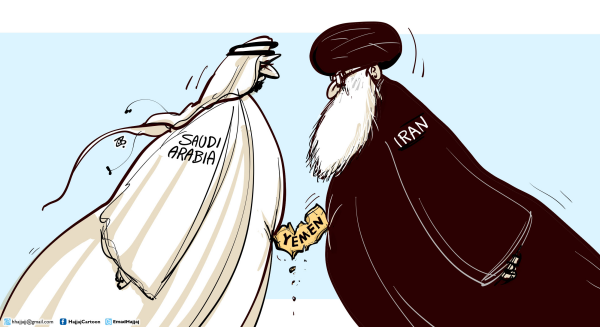
U.S. Secretary of Defense Lloyd Austin has announced a new military effort in the Middle East: Operation Prosperity Guardian. It will bring together a coalition of nations to safeguard the dangerous waters of the Red Sea, North Arabian Sea and western Indian Ocean from surprisingly sophisticated attacks by Iranian-sponsored terrorists from the Houthi rebellion in Yemen.
In recent weeks, the Houthis have conducted an escalating series of attacks against merchant shipping using drones, ballistic missiles and commandos on helicopters and speedboats. As a video released by the Houthis shows, these well-equipped teams move with military precision.The new mission is aptly named, as it is designed to protect the 15% of global shipping that passes through the region. The U.S. Navy will command it through Task Force 153, a counterpiracy flotilla based in Bahrain. So far a robust group of nations have signed on: local states Bahrain and the Seychelles, as well as North Atlantic Treaty Organization members Canada, France, Italy, the Netherlands, Norway, Spain and the UK. In addition, nearly 40 countries already participate in Task Force 153 and many are likely to soon join Operation Prosperity Guardian.
U.S. warships are already patrolling the waters, and two of them — the guided-missile destroyers USS Mason and USS Carney — have been under more or less daily attack, shooting down dozens of drones and rescuing several commercial ships. In mid-November, the Houthis successfully captured one private ship, a vehicle carrier called the Galaxy Leader, and are holding it and 25 mariners hostage in a port on the Red Sea. Tensions and attacks are likely to continue to escalate, largely at the behest of the Iranian theocracy.
I know these waters well. In addition to numerous deployments as captain of a guided-missile destroyer and as commodore of a squadron of destroyers, I led a carrier strike group in the region as a one-star rear admiral. When I was NATO's military commander in the early 2010s, we put together a task force to fight Somali pirates off the horn of Africa. Those experiences lead me to believe this new mission will ultimately be successful — if the force follows some basic tenets.
First, we need to fully understand what is driving this surge in attacks. The Houthi rebels are supplied, organized, trained and encouraged by Tehran. They claim their attacks are in response to the Israeli counterattacks on Hamas in the Gaza Strip, but a more likely explanation is that they are probing for weaknesses to set up future attacks by Iran against Western interests. The assaults will also likely cause oil prices to rise, benefitting the Iranians, and perhaps increase Western pressure on Israel to pare back its attacks in Gaza.
Thus the U.S. and its partners may have to do more than put additional warships on defensive patrol. We must be prepared to go on offense: to carry out offensive strikes against targets ashore, perhaps using Tomahawk missiles and attack aircraft from the carrier USS Eisenhower, now patrolling the Gulf of Oman. Such strikes would be legitimate under the law of war and should be proportional, meaning against Houthi infrastructure on the southern Arabian peninsula.
If this doesn't have a calming effect on Houthi activities, it would be entirely appropriate to strike the sponsor — Iran — especially its maritime infrastructure in the north Indian Ocean and the Gulf. This could include oil and gas platforms, port facilities and patrol vessels of the Islamic Revolutionary Guard Corps. Obviously, we must do our utmost to avoid further escalation, but both the Houthis and Tehran must see there is a real price to pay.
A second element of Operation Prosperity Guardian must be a fully integrated intelligence picture. The sea space that the maritime operators must cover is remarkably vast. The Red Sea — from the Suez Canal to the Bab el Mandeb on the horn of Africa — is the size of California. To cover the rest of the North Arabian Sea and the approaches to the Red Sea, you can add another chunk nearly double the size of Alaska. Even if you had 20 warships on patrol — a very high number for a maritime mission — it would be like 20 police cruisers trying to cover America's entire Pacific Coast.
The key here is wide-area surveillance. This can be accomplished with satellite information and long-dwell drones — most of the nations signed up operate such craft. But the key will be coordination among the new partners: All of this data needs to be fed into the task force command center, which will probably be in the headquarters of the U.S. Fifth Fleet in Manama, Bahrain. I've been there many times and it is a state-of-the-art facility with not only drone and satellite intelligence capabilities, but also human intelligence, mobile-phone monitoring, open-source analysis, and lots of allied data streams all coming together.
The U.S. and coalition partners had plenty of practice at such cooperation this during the height of the Somali piracy operations, although that was admittedly a far easier opponent than the Houthis.
Third, the U.S. should work hard at expanding the circle of allies and partners. The Saudis are not yet formally associated with Operation Prosperity Guardian, but they could be crucial members given their extensive network of naval bases on the Red Sea. The United Arab Emirates, also not onboard as of now, has capable warships and solid intelligence-gathering capabilities. The catch is that the two Gulf Arab nations have differing views on how to approach the Houthi problem — the UAE is calling for strong military action against the rebels, while Riyadh wants a more measured approach. They need to be persuaded to put this spat aside and deal with the immediate crisis.
There could also be direct European Union participation in the task force: It has had an active counterpiracy mission, Operation Atalanta, since 2008.
Finally, given that the targets are largely commercial shipping, the U.S. will need to engage with the private sector more extensively. This can best be done by working with the largest shipping companies — Maersk, MSC and British Petroleum have all paused operations in the Red Sea — through the International Maritime Organization, a United Nations agency headquartered in London. During counterpiracy operations a decade ago, the IMO was a key convener in private-public cooperation. Onboard security teams will have to be considered, for example, and that can only be done by the shipping companies themselves.
Countering well-trained, well-armed Houthi rebels guided by Iran will be difficult. But Operation Prosperity Guardian, using the lessons of Somali counterpiracy and updating them for new threats, is a step in the right direction.
(COMMENT, BELOW)
Stavridis is a Bloomberg columnist. He is a retired U.S. Navy admiral and former supreme allied commander of NATO, and dean emeritus of the Fletcher School of Law and Diplomacy at Tufts University. He is also an operating executive consultant at the Carlyle Group and chairs the board of counselors at McLarty Associates.
Previously:
• 11/22/23 Send America's floating hospitals to Gaza
• 11/08/23 What the US should do about Iran
• 08/30/23 Haiti needs a new UN mission, this time led by the US
• 08/16/23 To stop Iran's threat to Gulf ships, send the Marines
• 07/28/23 NATO convoys can protect Ukraine's grain harvest from Putin
• 07/28/23 Sweden and Finland give NATO an Arctic opportunity
• 07/11/23 US military's recruiting woes are a national-security crisis
• 06/02/23 Ukraine war may become a proving ground for AI
• 05/16/23 Iran's tanker seizures may bring U.S. convoys back to the Gulf
• 05/08/23 Sudan rescue mission is helping the US Navy prepare for war
• 05/01/23 Ukraine is running out of ammo. So is the US
• 03/10/23 The US military must create a Cyber Force
• 12/07/23 Putin will carpet-bomb Ukraine unless the West acts
• 10/14/22 Putin's campaign of terror from the air is already failing
• 09/08/22 Iran reveals how its naval warfare is changing
• 08/02/22 US needs a global alliance against Russia's cyberattacks
• 06/28/22What to expect from NATO's new strategic concept
• 04/13/22 Nukes? Ukraine war's most potent weapon may be a cell phone
• 01/18/22 Russia is pushing Finland and Sweden toward NATO
• 10/20/21 What Colin Powell taught me about war and optimism
• 09/14/21 Why the U.S. Navy is hunting pirates off Africa
• 07/29/21 Cuba and how Biden can avoid another Mariel boatlift
• 07/01/21 Donald Rumsfeld never gave in
• 02/16/21 Keeping troops in Afghanistan makes America safer
• 08/19/20 Military reasons to celebrate the Israel-UAE deal
• 07/02/20 Taliban bounties would be a new low even for Putin
• 01/02/20 May the 'Space Force' be with you
• 08/02/19 What Iran will do next, and how to stop it
• 05/06/19 The 'Five Eyes' intelligence-sharing alliance should expand, starting with Israel and Japan
• 04/24/19 Sri Lanka attacks mark the birth of terrorism 3.0
• 01/14/19 Iran's tiny navy is trying to revive the Persian Empire
• 06/04/18 US was right to give China's navy the boot
• 06/04/18 Big winner of Colombia's election is the US
• 05/17/18 Great power politics is back as U.S. aims at Russia with resurrected Navy fleet
• 03/20/18 Fake advice for Putin's fake win


 Contact The Editor
Contact The Editor
 Articles By This Author
Articles By This Author